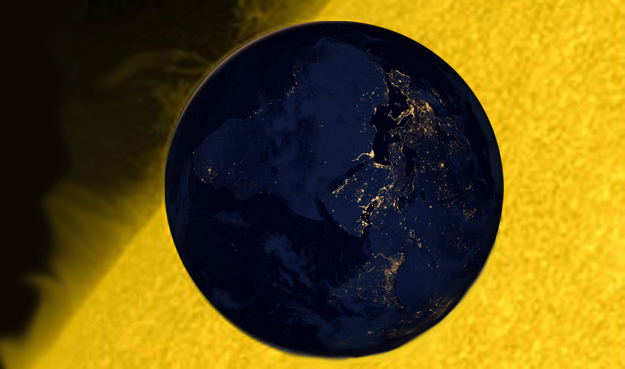Impact of Space Weather on Climate and Habitability of Terrestrial Type Exoplanets

The current progress in the detection of terrestrial type exoplanets has opened a new avenue in the characterization of exoplanetary atmospheres and in the search for biosignatures of life with the upcoming ground-based and space missions.
To specify the conditions favorable for the origin, development and sustainment of life as we know it in other worlds, we need to understand the nature of astrospheric, atmospheric and surface environments of exoplanets in habitable zones around G-K-M dwarfs including our young Sun. Global environment is formed by propagated disturbances from the planet-hosting stars in the form of stellar flares, coronal mass ejections, energetic particles, and winds collectively known as astrospheric space weather. Its characterization will help in understanding how an exoplanetary ecosystem interacts with its host star, as well as in the specification of the physical, chemical and biochemical conditions that can create favorable and/or detrimental conditions for planetary climate and habitability along with evolution of planetary internal dynamics over geological timescales.
A key linkage of (astro) physical, chemical, and geological processes can only be understood in the framework of interdisciplinary studies with the incorporation of progress in heliophysics, astrophysics, planetary and Earth sciences. The assessment of the impacts of host stars on the climate and habitability of terrestrial (exo)planets will significantly expand the current definition of the habitable zone to the biogenic zone and provide new observational strategies for searching for signatures of life. The major goal of this paper is to describe and discuss the current status and recent progress in this interdisciplinary field and to provide a new roadmap for the future development of the emerging field of exoplanetary science and astrobiology.
V.S. Airapetian, R. Barnes, O. Cohen, G.A. Collinson, W.C. Danchi, C.F. Dong, A.D. Del Genio, K. France, K. Garcia-Sage, A. Glocer, N. Gopalswamy, J.L. Grenfell, G. Gronoff, M. G”udel, K. Herbst, W.G. Henning, C.H. Jackman, M. Jin, C.P. Johnstone, L. Kaltenegger, C.D. Kay, K. Kobayashi, W. Kuang, G. Li, B.J. Lynch, T. L”uftinger, TJ.G. Luhmann, H. Maehara, M.G. Mlynczak, Y. Notsu, R.M. Ramirez, S. Rugheimer, M. Scheucher, J.E. Schlieder, K. Shibata, C. Sousa-Silva, V. Stamenkovi’c, R.J. Strangeway, A.V. Usmanov, P. Vergados, O.P. Verkhoglyadova, A.A. Vidotto, M. Voytek, M.J. Way, G.P. Zank, Y. Yamashiki
(Submitted on 9 May 2019)
Comments: 206 pages, 24 figures, 1 table; Review paper. International Journal of Astrobiology (2019)
Subjects: Earth and Planetary Astrophysics (astro-ph.EP)
Cite as: arXiv:1905.05093 [astro-ph.EP] (or arXiv:1905.05093v1 [astro-ph.EP] for this version)
Submission history
From: Vladimir Airapetian
[v1] Thu, 9 May 2019 22:54:43 UTC (6,235 KB)
https://arxiv.org/abs/1905.05093
Astrobiology








